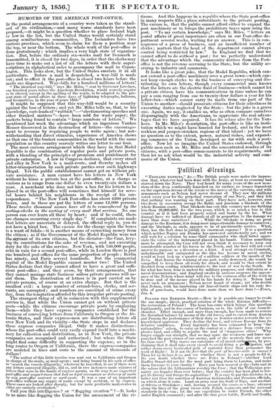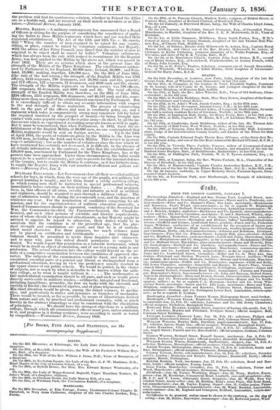Volitital (Mutating.
" ENGLAND uxrucrs," &c.—The British people were under the impres- sion that, whatever had been done with the Army, at least no economy bad starved down the Navy. They had heard for many years of the new mon- sters of.the deep continually launched on its surface, no longer dependent on the capricious favour of the winds or the mercy of the currents, and with armaments such as Nelson had never dreamt of. They saw the millions voted every year for the perpetual renovation of our Navy, and they felt that nothing was wanting on their part. They have now, however, seen two fleets in succession occupy the Baltic and proclaim a blockade of the whole Russian coast. That blockade has cost this country not one farthing less than 20,000,0001. for the two years, which is as much a loss to this country as if it had been property seized and burnt by the foe. What damage have we inflicted on Russia at all in proportion to the damage we have thus done ourselves ; While the blockade- is doing no great dama"e to the Russians, it is doing most unquestionable damage to ourselves ; and the blockade, as such, appears to be of questionable service. What, then, has the fleet done to justify its enormous expense ? It is a question which neither Napier. nor Dundas has answered satisfactorily yet ; and we Still wait for a solution by some third commander who shall better appre- ciate the value of the instrument placed in his hands. Unless something more be attempted, the Czar will not even think it necessary to keep any considerable number of his forces in the North, and the fleet will not even answer its purpose as a diversion or a feint. A real attempt on Cronstadt, unfashionable and antiquated as the idea has become in naval circles, would at least lock up a quarter of a million soldiers at the mouth of the Neva. Had Russia the warning of one port really destroyed, she would be compelled to keep them all ready for attack, and would to that extent be disabled from sending reinforcements to the seat of war in the South. So far what has been done is useless for military purposes, and ridiculous as a naval demonstration; and England awaits in anxious suspense the appear- ance of the Nelson whose mind will rise to the vastness alike of the work to be done and of the means placed in his hands for doing it. Nelson had never such an armament ; Nelson never hoard of steam ; yet who doubts that Nelson, with his lumbering old line-of-battle ships and his rude flo- tilla of gun-boats, would have done more than we have done ?—Tunes, Jan. 4.
POLAND THE BAGETER STATE.—How is it possible any longer to evade the one simple, direct, practical solution of the whole Russian difficulty— the restoration of Poland ? The hour has come which brings this question legitimately, and in due course of business, on to the table of our council- chamber. Effort enough, and more than enough, has been made to restore the disturbed balance by means of the old forces, and to extort from Austria and Prussia the performance of their duty as frontier-states towards the ac- knowledged aggressor. They decline the trust, and release Europe from its delusive confidence. Every ingenuity has been exhausted to keep the nationalities' asleep, to carry on the contest at a distance from every ex- plosive hind, and coldly to repulse the zeal of ' dangerous allies.' Why longer cripple our strength, that we may spare the weakness and leave un- punished the past crimes of our enemy, and of the neutrals that are more his than ours ? Why starve our enterprise of all moral entIgiesin, by pro- claiming that it shall take every circuit to avoid doing a giWjnstioe, and rather storm every barricaded path of material force than pronounce the word of Right ? •Is it not the fact that the post of barrier-state is vacant I Then let us declare it so, and see whether there is not a people to fill it. Do you doubt whether there are Poles in Poland ?—whether Lord Dudley Stuart did not for the most part bring them to London, and make them tiresome to your charity ? Have you been assured at the clubs and in the salons that the Lithuanians worship the Czar ; that the Volhynian pea- santry are happier than ever before ; that the country has been glad to for- get its history and forego its aspirations ? It is easy to put this doctrine to a better teat than the assertion of Austrian fashionables and Prussian officials, on which alone it rests. Laud an army near the Gulf of Riga, and another at Odessa or Otschakov ; and, having secured the coasts as a base, advance along the lines of the great rivers with Polish regiments and the national standards in the van ; let the one expedition be under French, the other under English command ; and after the first great battle, North and South, the problem will find its spontaneous solution, whether in Poland the Allies are on a hostile soil, and are received on their march as invaders or as libe- rators.-Hational eview, January 1856.
Mn mA BALLOT.-A military contemporary has announced that a Board of Officers is sitting for the purpose of considering the expediency of apply- ing the ballot to those Militia regiments which have not yet reached their regulated establishment. The Act of the 15th and 16th ti ie. c. 50, enacts, that " When the number of men required to be raised for any county, riding, or place, cannot be raised by voluntary enlistment, her Majesty, with the advice of her Privy Council, may direct that the number of men so required to be raised Atoll be raised by ballot." Voluntary enlistment, which has always been the rule with respect to recruitment for the Regular Army, was first applied to the Militia by the above act, which was passed in June 1852. There are no returns which show at the present tune the strength of the Militia of the Three Kin doms. The establishment author- ized by Parliament is, for England, 80,7; f men ; Ireland, 30,000 ; and Scot- land, 10,000; making, together, 120,000 men. On the 30th of June 1855, (the date of the last return,) the strength of the English Militia was 1764 officers, 2123 sergeants, 780 drummers, and 29,885 rank and file, present ; and 272 officers, 122 sergeants, 21 drummers, and 6048 rank and file, absent. The strength of the Militia regiments on foreign service was 198 officers, 286 sergeants, 95 drummers, and 4608 rank and file. The total effective strength of the English Militia was, therefore, on the 30th of June 1855, 2234 officers, 2531 sergeants, 896 drummers, and 40,541 rank and file, some- thing more than one-half of the establishment sanctioned by Parliament. But it is exceedingly difficult to obtain any accurate information with respect to the real strength of these regiments. The process of volunteering both on the part of the officers and men is constantly going on, and a regiment which today is comparatively strong may tomorrow full far below the required standard by the prospect of bounty-by being brought into contact with some popular corps of the regular army-in short, by all the in- ducements which an experienced recruiting-sergeant knows so well to apply. But it must be remembered, that when Parliament, in 1852, fixed the es- tablishment of the English Militia at 80,000 men, no one contemplated that Militia regiments would be sent on foreign service. . . . . 1.7p to the 14th of April 1855, the quota of volunteers given by the Militia to the Line was
in
19,450 men, including the Irish and Scotch 'Millie. This review is in every respect satisfactory ; but as the number of volunteers since the date which we have mentioned has certainly not decreased, it is difficult, in the absence of all definite information to the contrary, to infer that the establishment of 120,000 men, sanctioned by Parliament for the Three Kingdoms, has at the present time been approached. Under these circumstances, the ballot would appear to be a matter of necessity, not only to provide for the internal defence of the country, but to enable the Militia to continue, as it has hitherto done, to supply the Regular Army with vast numbers of efficient and gallant sol- diers.-Morning Post, Jun. 2.
MILITARY EDUCATION.-Let Government close all their so-called military schools for boys, in which, from the very age of the pupils, not military but general learning is taught ; and let them found a really military college, m which young men shall be instructed in special professional subjects, immediately before entering on their military duties Our proposal, then, is, that officers of all arms, cavalry and infantry as well as artillery and engineers, should be required to pass through a military college. The age of admission would be during the seventeenth year, and the duration of residence one y ear. For the nomination of candidates competing for ad- mission, and for the superintendence of military education generally, a Board of Commissioners should be appointed, consisting of the Secretary for War, the Commander-in-chief, the Paymaster-General, the Chaplain- General, and such other persons of scientific and literary acquirements, some of whom should be experienced educationists, as her Majesty might be advised to appoint. In regard to admission, their duties would be to ascertain that the candidate is of the prescribed age, that his phy- sical strength and constitution are good, and that he is of unblem- ished moral character. For these purposes, too much reliance must not be placed on certificates and testimonials Any young Eng- lishman should be permitted to invite these inquiries into character, and to none who pass this ordeal should permission to conmete be denied. We would regard this permission as a valuable testimonial, which would be in itself an object of emulation, and of use to a young men in any profession. The actual admission into the college would depend on the re- sults of a competitive examination between the candidates of approved cha- racter. The subjects of the examination would be fixed, and such as are considered essential parts of a general and liberal as distinguished from a professional education, having in view the proficiency usually reached in the upper classes of our public schools. We would be guided, in the choice of subjects, not so much by what is desirable to be known within the mili-
tary college, as by what is taught without it The mathematics at this matriculation examination should be all pure, and such as would prove directly serviceable in military studies -arithmetic, integral and fractional, including logarithms ; geometry, the first six books with the eleventh and twelfth of Euclid ; the elements of algebra, and of plane trigonometry His chief attention would be given, among the mixed sciences, to mecha- nics, and particularly to statics and dynamics as branches of mechanics. These would be treated, as far as possible, by means of illustrations derived from nature and art, by practical and professional examples, with as much brevity in the abstract reasonings as may be consistent with the elucidation of principles We should have the strongest objections to a military
college, through which all commissioned officers must pass, unless admission to it, and progress in it during residence were according to merit as tested by competition.- Westminster Review, January 1856.











































 Previous page
Previous page